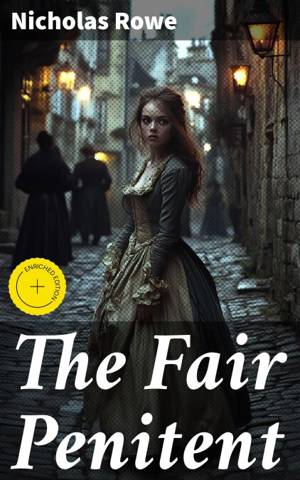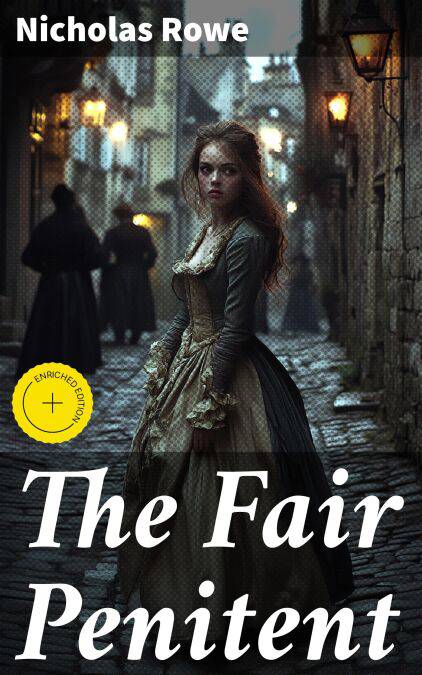
Bedankt voor het vertrouwen het afgelopen jaar! Om jou te bedanken bieden we GRATIS verzending (in België) aan op alles gedurende de hele maand januari.
- Afhalen na 1 uur in een winkel met voorraad
- In januari gratis thuislevering in België
- Ruim aanbod met 7 miljoen producten
Bedankt voor het vertrouwen het afgelopen jaar! Om jou te bedanken bieden we GRATIS verzending (in België) aan op alles gedurende de hele maand januari.
- Afhalen na 1 uur in een winkel met voorraad
- In januari gratis thuislevering in België
- Ruim aanbod met 7 miljoen producten
Zoeken
The Fair Penitent E-BOOK
Enriched edition. Love, Betrayal, and Redemption: A Tragic Tale of Penitence in 18th Century English Drama
Nicholas Rowe
E-book | Engels
€ 1,99
+ 1 punten
Uitvoering
Omschrijving
In "The Fair Penitent," Nicholas Rowe explores the intricate dynamics of love, guilt, and redemption through a richly structured plot and lyrical language. Set against the backdrop of Restoration England, this tragedy delves into the moral complexities faced by its characters, particularly the hapless heroine, Calista, who finds herself torn between passion and virtue. Rowe's use of dramatic dialogue and evocative imagery not only heightens the emotional stakes but also effectively mirrors the societal struggles of his time, shedding light on evolving views of female agency and morality. Nicholas Rowe was a pivotal figure in the early 18th-century literary landscape, serving not only as a playwright but also as a poet and biographer. His experiences and observations of London society, as well as a deep engagement with classical and contemporary literature, informed his sensitive portrayal of the tensions within personal relationships. Rowe's commitment to crafting humanized characters amidst their moral dilemmas reveals an introspective understanding of the universal search for identity and belonging in a changing world. For readers seeking a profound exploration of human emotions intertwined with the socio-political fabric of its era, "The Fair Penitent" offers a compelling narrative. With its timeless themes and poignant characterizations, this play is not only a significant contribution to the canon of Restoration tragedy but also remains relevant for contemporary audiences, urging them to reflect on the enduring complexities of human desire and remorse.
In this enriched edition, we have carefully created added value for your reading experience:
- A succinct Introduction situates the work's timeless appeal and themes.
- The Synopsis outlines the central plot, highlighting key developments without spoiling critical twists.
- A detailed Historical Context immerses you in the era's events and influences that shaped the writing.
- A thorough Analysis dissects symbols, motifs, and character arcs to unearth underlying meanings.
- Reflection questions prompt you to engage personally with the work's messages, connecting them to modern life.
- Hand‐picked Memorable Quotes shine a spotlight on moments of literary brilliance.
- Interactive footnotes clarify unusual references, historical allusions, and archaic phrases for an effortless, more informed read.
In this enriched edition, we have carefully created added value for your reading experience:
- A succinct Introduction situates the work's timeless appeal and themes.
- The Synopsis outlines the central plot, highlighting key developments without spoiling critical twists.
- A detailed Historical Context immerses you in the era's events and influences that shaped the writing.
- A thorough Analysis dissects symbols, motifs, and character arcs to unearth underlying meanings.
- Reflection questions prompt you to engage personally with the work's messages, connecting them to modern life.
- Hand‐picked Memorable Quotes shine a spotlight on moments of literary brilliance.
- Interactive footnotes clarify unusual references, historical allusions, and archaic phrases for an effortless, more informed read.
Specificaties
Betrokkenen
- Auteur(s):
- Uitgeverij:
Inhoud
- Aantal bladzijden:
- 42
- Taal:
- Engels
Eigenschappen
- Productcode (EAN):
- 4064066418205
- Verschijningsdatum:
- 7/12/2020
- Uitvoering:
- E-book
- Beveiligd met:
- Digital watermarking
- Formaat:
- ePub

Alleen bij Standaard Boekhandel
+ 1 punten op je klantenkaart van Standaard Boekhandel
Beoordelingen
We publiceren alleen reviews die voldoen aan de voorwaarden voor reviews. Bekijk onze voorwaarden voor reviews.









